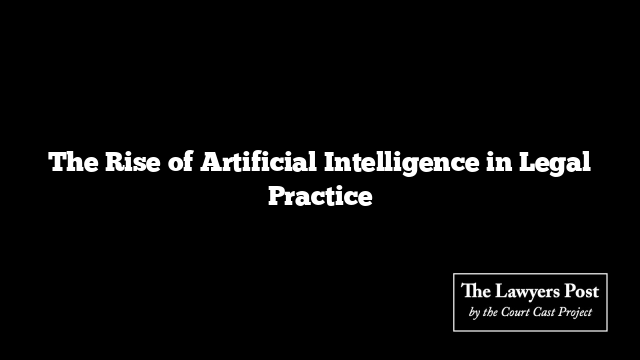Artificial Intelligence (AI) is no longer a futuristic concept confined to science fiction; it is a transformative force reshaping industries across the globe, including the legal sector. As AI technology advances, its integration into legal practice is revolutionizing how lawyers work, enhancing efficiency, accuracy, and strategic decision-making. This article delves into the multifaceted applications of AI in legal practice, with a particular focus on its impact in India.
Legal research is a cornerstone of legal practice, traditionally involving labour-intensive processes of sifting through vast amounts of case law, statutes, and legal literature. AI-powered legal research tools are changing this landscape by automating and accelerating these tasks. AI algorithms, equipped with Natural Language Processing (NLP), can quickly analyse legal documents and case law, providing lawyers with highly relevant information. This capability not only saves significant time but also enhances the precision of legal research. By uncovering hidden patterns and insights, AI tools enable lawyers to build stronger cases and make more informed decisions. For instance, AI-driven platforms like ROSS Intelligence and LexisNexis leverage machine learning to understand and interpret legal language, improving search results and making it easier to find pertinent information. These tools can process and analyse large volumes of data much faster than traditional methods, allowing legal professionals to focus on more complex and strategic aspects of their cases.
Contract analysis is another area where AI is making a substantial impact. Reviewing and extracting key terms from contracts is a time-consuming process that AI can streamline significantly. AI tools automate the extraction of important metadata, such as parties involved, effective dates, and termination clauses, speeding up due diligence and contract management processes. Intelligent search and data extraction capabilities allow AI to identify and highlight potential risks, ensuring compliance with legal requirements. Predictive coding and clustering techniques group similar texts for easier review and prioritize pertinent documents, enhancing the efficiency of contract analysis. AI-driven platforms like Kira Systems and Luminance are leading the way in this domain, offering solutions that not only automate contract review but also provide clause-level text recommendations. These tools help legal professionals identify potential issues more efficiently and ensure that contracts are compliant with relevant regulations.
Predictive analytics is one of the most promising applications of AI in legal practice. By analysing historical data, AI models can predict case outcomes, aiding attorneys in making data-driven decisions and optimizing their litigation strategies. Outcome prediction capabilities allow AI to assess the likelihood of a case’s success and suggest the best legal arguments to use. This not only enhances the strategic planning of legal cases but also provides valuable insights into trends and patterns in legal data. AI tools like Lex Machina and Premonition leverage predictive analytics to offer strategic insights and risk assessments. These tools help legal teams identify potential issues and develop informed strategies for their cases, ultimately improving client outcomes and reducing the time and cost associated with litigation.
The integration of AI into the Indian legal landscape is gaining momentum, with several initiatives and tools being developed to enhance the efficiency and accuracy of legal processes. The Supreme Court of India’s Vidhik Anuvaad Software (SUVAS) is a notable example, using AI to translate court orders and legal documents into multiple languages, making them more accessible. The e-Court system in India allows users to access court orders and judgments online, significantly saving time and resources. Legal tech start-ups in India are also developing AI solutions for legal research, improving the accuracy and efficiency of retrieving and summarizing relevant legal documents. However, the adoption of AI in the Indian legal sector is not without challenges. Privacy and data protection are paramount concerns, as AI systems require access to sensitive data. Legal professionals must ensure stringent data security and privacy measures to safeguard client information.
Algorithmic bias is another significant challenge. Ensuring that AI systems are trained on diverse and representative data is crucial to avoid perpetuating biases that could impact decision-making. Additionally, India still lacks strong laws governing AI, necessitating the development of robust regulatory frameworks to outline the responsibilities and liabilities of AI systems. While AI offers numerous advantages, it also raises ethical considerations that must be addressed. The potential for errors and confidentiality breaches requires that AI tools be used responsibly within the legal profession. Ensuring that AI systems are transparent and accountable is essential to maintaining trust and integrity in legal practice. Continuous learning and development are crucial for legal professionals to stay competitive in this evolving landscape. Law firms must invest in training programs to ensure their employees are proficient with the latest legal technologies and best practices. The future of AI in legal practice is promising, with the potential to enhance the quality of legal services and promote greater access to justice. By leveraging AI technologies, legal professionals can focus on higher-level tasks that require human expertise, ultimately improving client outcomes and driving innovation in the legal sector.
The rise of AI in legal practice marks a new era for the legal profession, characterized by enhanced efficiency, accuracy, and strategic decision-making. In India, the integration of AI is poised to improve the functioning of the judicial system and legal services, provided that challenges related to privacy, bias, and regulation are addressed.
As AI continues to evolve, its impact on the legal sector will only grow, offering new opportunities for legal professionals to innovate and excel. By embracing AI, the legal profession can navigate the complexities of the modern legal landscape and deliver better outcomes for clients and society as a whole.





